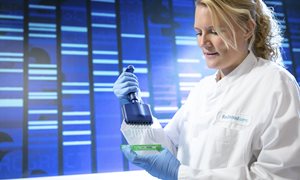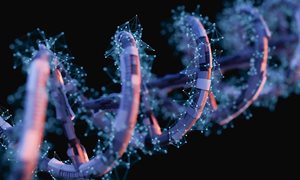
People who have a serious developmental disorders often get it because of a mutation, an error that disrupts the action of a gene on the DNA. There are many possible mutations that can cause such abnormalities, but in varying degrees of rarity. By creating a huge dataset, the researchers were able to describe 28 previously unknown genes that can cause developmental disorders.
The study, a collaboration of Christian Gilissen, theme Metabolic Diseases, Laurens van de Wiel, theme Nanomedicine, with GeneDx and the Wellcome Sanger Institute, has been published in the scientific journal Nature, shows the necessity of bringing data together.
When someone turns out to have a serious developmental disorders, the cause is often a 'de novo mutation'. This means a mutation in the genetic material that is new in the sperm or egg cells of one of the parents - and therefore cannot be found in the parents themselves. These de novo mutations, often mutations of a single letter or nucleotide in the DNA, can affect all sorts of different genes and therefore lead to different characteristic disorders.
Largest database ever for these mutations
Although there is a significant group of patients with severe developmental disorders, the mutations responsible are rare on an individual basis. Finding the exact causal genes is therefore difficult, because the chance of accidentally finding multiple patients with mutations in the same gene is small.
In this study, therefore, datasets from three different institutes have been combined into a cohort of 31,058 patients, in order to have more statistical power. It became the largest statistical study of these mutations to date, and resulted in as many as 28 new genes that can now be linked with certainty to a severe developmental disorders.
Consequences for the clinic
The genes explained the developmental disorders of about 1% of the patients in the study, which means that 600 patients from the cohort were diagnosed. But also in the clinic, the mutations described in this article can now be tested in people with severe developmental disorders. Worldwide, many thousands of patients can be diagnosed with the new knowledge.
According to Radboudumc researcher Christian Gilissen, the study also shows that the low-hanging fruit is now gone. "It is estimated that there are still a thousand genes that play a similar role in severe developmental disorders, but that will be even more difficult to find. This makes it even more important to share patient data in order to create even larger datasets".
Related news items

New genetic defect links cell biology and protein glycosylation
10 November 2021 Peter Linders, Dirk Lefeber and Geert van den Bogaart together with international colleagues have recently reported on novel cell biological insights, by identifying a genetic disorder in syntaxin-5 which allowed to unravel a new mechanism regulating intracellular transportation. go to page
RIMLS awards call for nominations
19 October 2021 RIMLS awards several prizes to stimulate and honor our (young) researchers. Upcoming awards are Supervisor of the Year, Best Master Thesis, Best Publication, Best Image and more. Send your nominations now before 24 November 2021. go to page
Miniaturized microfluidic platform for automated epigenetic profiling
6 May 2021 Together with Fluidigm, a US-based company focusing on microfluidics, the team of Hendrik Marks publishes in Genome Research the development of a powerful plug and play ChIP-seq platform for minute amount of cells, such as embryonic specimens or small biopsies. go to page
RIMLS online award ceremony proudly presenting the winners
13 January 2021In this special webinar of the RIMLS New Year Celebration, scientific director René Bindels reviewed 2020 and looked forward to 2021. But more importantly a number of researchers received prizes in the traditional RIMLS awards ceremony.
go to page
Metakids-UMD grant for Purva Kulkarni
18 June 2020 The Metakids foundation has awarded 220.575 Euro to support the establishment of a multi-omics biomarker platform within the United for Metabolic Disease (UMD) consortium. go to page
MetaDome highly accessed
7 May 2020MetaDome was recently recognized as one of the most accessed articles of 2018-2019 in Human Mutation. The MetaDome was a project developed by Laurens van de Wiel, Christian Gilissen, and Gert Vriend.
go to page